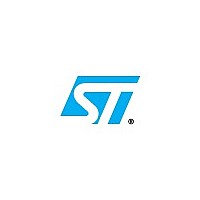ST10F276-6Q3 STMicroelectronics, ST10F276-6Q3 Datasheet - Page 195

ST10F276-6Q3
Manufacturer Part Number
ST10F276-6Q3
Description
MCU 16BIT 832K FLASH 144-PQFP
Manufacturer
STMicroelectronics
Series
ST10r
Datasheet
1.ST10F276-4TR3.pdf
(231 pages)
Specifications of ST10F276-6Q3
Core Processor
ST10
Core Size
16-Bit
Speed
64MHz
Connectivity
ASC, CAN, EBI/EMI, I²C, SSC, UART/USART
Peripherals
POR, PWM, WDT
Number Of I /o
111
Program Memory Size
832KB (832K x 8)
Program Memory Type
FLASH
Ram Size
68K x 8
Voltage - Supply (vcc/vdd)
4.5 V ~ 5.5 V
Data Converters
A/D 24x10b
Oscillator Type
Internal
Operating Temperature
-40°C ~ 125°C
Package / Case
144-MQFP, 144-PQFP
Lead Free Status / RoHS Status
Lead free / RoHS Compliant
Eeprom Size
-
- Current page: 195 of 231
- Download datasheet (5Mb)
ST10F276E
23.8.3
23.8.4
23.8.5
Clock generation modes
Table 95
mode.
Table 95.
1. The external clock input range refers to a CPU clock range of 1...64 MHz. Moreover, the PLL usage is
2. The limits on input frequency are 4-12 MHz since the usage of the internal oscillator amplifier is required.
3. The maximum depends on the duty cycle of the external clock signal: When 64 MHz is used, 50% duty
Prescaler operation
When pins P0.15-13 (P0H.7-5) equal ‘001’ during reset, the CPU clock is derived from the
internal oscillator (input clock signal) by a 2:1 prescaler.
The frequency of f
is, the duration of an individual TCL) is defined by the period of the input clock f
The timings listed in the AC Characteristics that refer to TCL can therefore be calculated
using the period of f
Note that if the bit OWDDIS in SYSCON register is cleared, the PLL runs on its free-running
frequency and delivers the clock signal for the Oscillator Watchdog. If bit OWDDIS is set,
then the PLL is switched off.
Direct drive
When pins P0.15-13 (P0H.7-5) equal ‘011’ during reset, the on-chip phase locked loop is
disabled, the on-chip oscillator amplifier is bypassed and the CPU clock is directly driven by
the input clock signal on XTAL1 pin.
The frequency of the CPU clock (f
low time of f
input clock f
1
1
1
1
0
0
0
0
(P0H.7-5)
P0.15-13
limited to 4-12 MHz input frequency range. All configurations need a crystal (or ceramic resonator) to
generate the CPU clock through the internal oscillator amplifier (apart from Direct Drive); on the contrary,
the clock can be forced through an external clock source only in Direct Drive mode (on-chip oscillator
amplifier disabled, so no crystal or resonator can be used).
Also, when the PLL is not used and the CPU clock corresponds to f
must be used: It is not possible to force any clock though an external clock source.
cycle shall be granted (low phase = high phase = 7.8ns); when 32 MHz is selected, a 25% duty cycle can
be accepted (minimum phase, high or low, again equal to 7.8ns).
1
1
0
0
1
1
0
0
associates the combinations of these 3 bits with the respective clock generation
1
0
1
0
1
0
1
0
CPU
XTAL
On-chip clock generator selections
f
f
f
f
f
f
f
f
XTAL
XTAL
XTAL
XTAL
XTAL
XTAL
XTAL
XTAL
f
CPU frequency
.
(that is, the duration of an individual TCL) is defined by the duty cycle of the
CPU
CPU
x 4
x 3
x 8
x 5
x 1
x 10
/ 2
x 16
XTAL
= f
is half the frequency of f
XTAL
for any TCL.
x F
CPU
4 to 8 MHz
5.3 to 10.6 MHz
4 to 8 MHz
6.4 to 12 MHz
1 to 64 MHz
4 to 6.4 MHz
4 to 12 MHz
4 MHz
External clock input
) directly follows the frequency of f
range
(1)(2)
XTAL
and the high and low time of f
Default configuration
Direct Drive (oscillator bypassed)
CPU clock via prescaler
XTAL
/2, an external crystal or resonator
Electrical characteristics
Notes
XTAL
so the high and
(3)
XTAL
CPU
.
195/231
(3)
(that
Related parts for ST10F276-6Q3
Image
Part Number
Description
Manufacturer
Datasheet
Request
R

Part Number:
Description:
MCU 16BIT 832K FLASH 144-LQFP
Manufacturer:
STMicroelectronics
Datasheet:

Part Number:
Description:
MCU 16BIT 832K FLASH 144-LQFP
Manufacturer:
STMicroelectronics
Datasheet:

Part Number:
Description:
MCU 16BIT 832K FLASH 144-PQFP
Manufacturer:
STMicroelectronics
Datasheet:

Part Number:
Description:
16-bit Microcontrollers - MCU 16-Bit MCU 832 kByte 68 KB RAM CMOS
Manufacturer:
STMicroelectronics

Part Number:
Description:
STMicroelectronics [RIPPLE-CARRY BINARY COUNTER/DIVIDERS]
Manufacturer:
STMicroelectronics
Datasheet:

Part Number:
Description:
STMicroelectronics [LIQUID-CRYSTAL DISPLAY DRIVERS]
Manufacturer:
STMicroelectronics
Datasheet:

Part Number:
Description:
BOARD EVAL FOR MEMS SENSORS
Manufacturer:
STMicroelectronics
Datasheet:

Part Number:
Description:
NPN TRANSISTOR POWER MODULE
Manufacturer:
STMicroelectronics
Datasheet:

Part Number:
Description:
TURBOSWITCH ULTRA-FAST HIGH VOLTAGE DIODE
Manufacturer:
STMicroelectronics
Datasheet:

Part Number:
Description:
Manufacturer:
STMicroelectronics
Datasheet:

Part Number:
Description:
DIODE / SCR MODULE
Manufacturer:
STMicroelectronics
Datasheet:

Part Number:
Description:
DIODE / SCR MODULE
Manufacturer:
STMicroelectronics
Datasheet:










